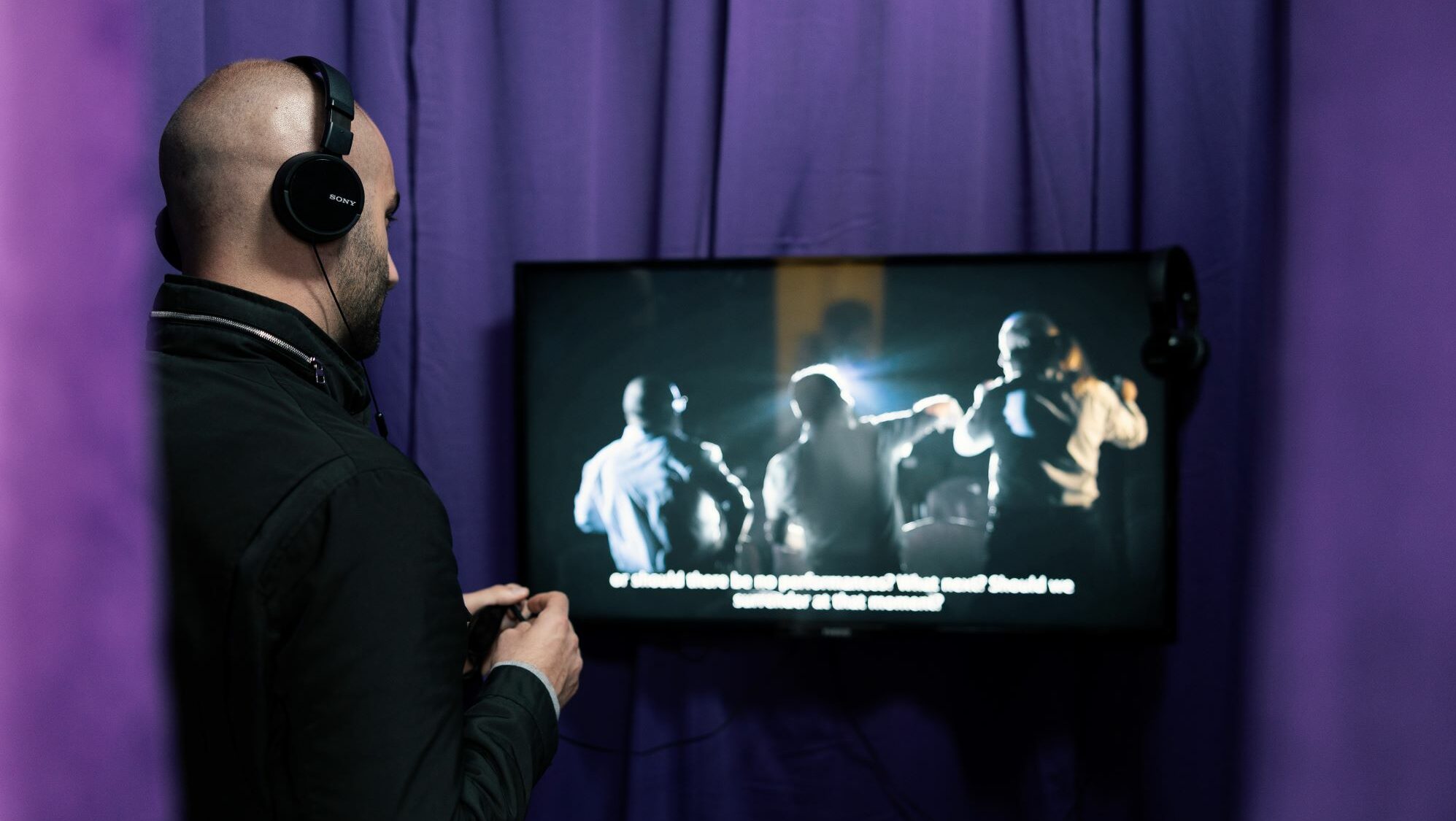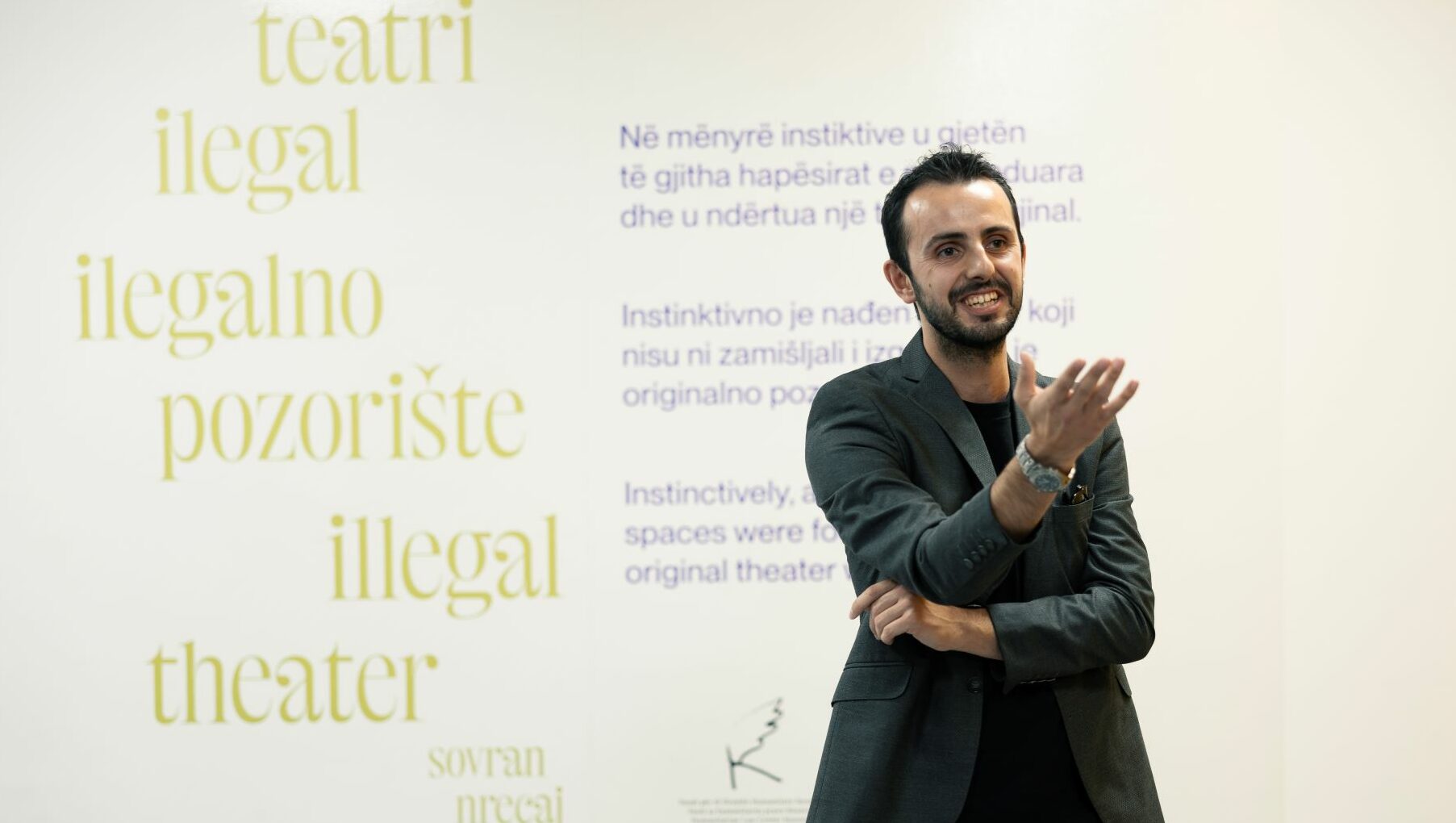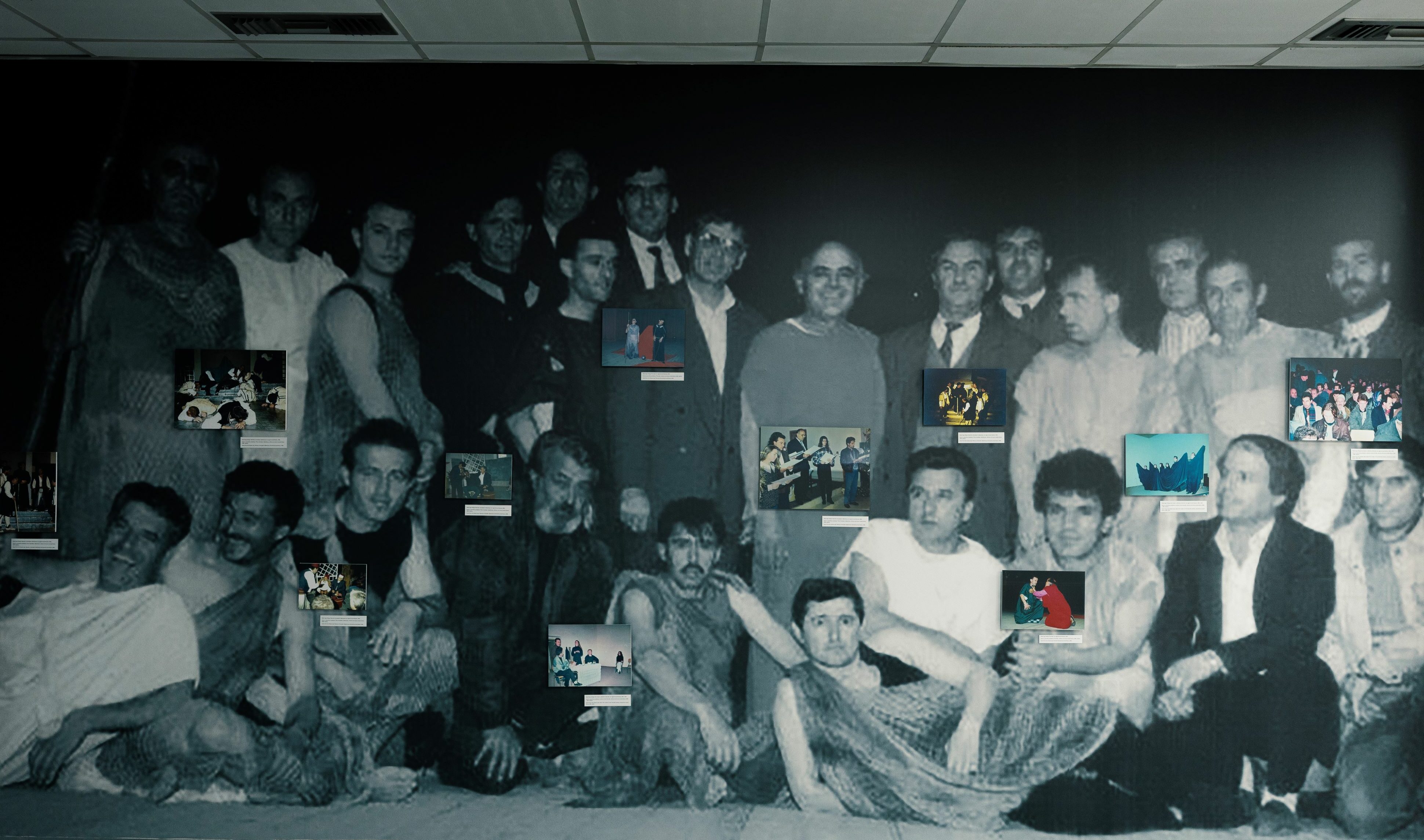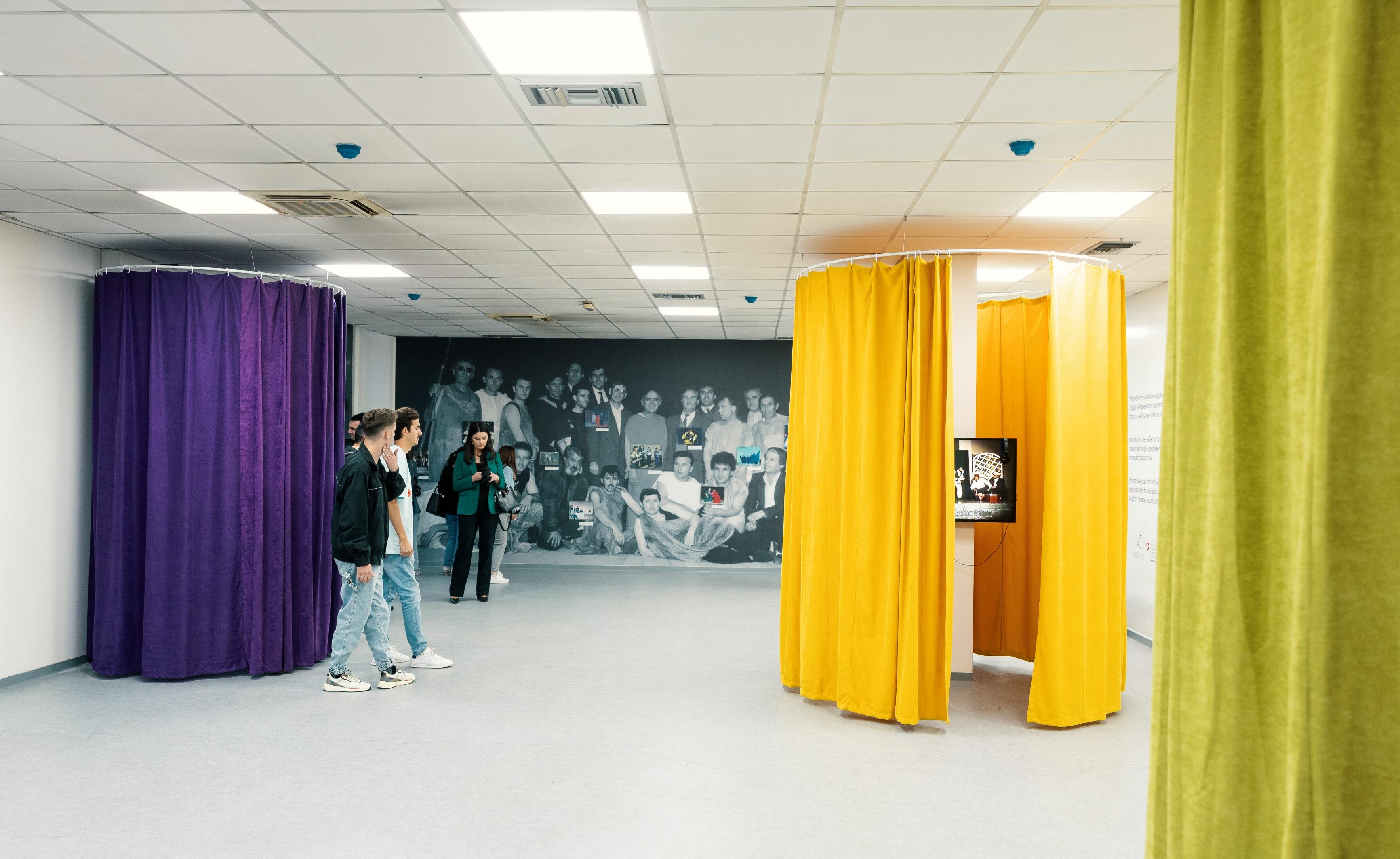Sovran Nrecaj’s immersive exhibition, Illegal Theater, transports us back to a time when artists, silenced by the Milosevic regime, turned homes, churches, and schools into theater stages, bringing the magic of storytelling to life in the face of adversity.
Three theater curtains, not in the usual black, but in vivid colors, surrounded small screens displaying three different parts of a documentary, in the Dardania neighborhood of Prishtina. The narrative of Ferizaj’s illegal theater unfolded through the firsthand stories of three eyewitnesses, actors of the Theatre of Ferizaj.
These documentaries bring a history that took place in the heart of Kosovo’s tumultuous past, when a clandestine movement emerged, defying an oppressive regime and finding consolation in the most unexpected of places—the world of illegal theater.

A visitors listening to the actors’ narratives about illegal theater in Ferizaj, under one of the tents in the Documentation Center. Photo: Etnik Nrecaj.
Slobodan Milosevic’s regime placed theater under violent administration, expelling Albanian artists and subjecting them to totalitarian control. In the absence of theaters, people opened the doors of their homes, churches, and schools to practice the words that needed to be spoken before the public but were suppressed by the authorities.
This exhibition of the young movie director from Ferizaj, Sovran Nrecaj, is not just a visual journey but a profound exploration of the human spirit’s resilience.
Each of the tents is placed to showcase an oral history of the illegal theater and the great struggle to overcome the oppressive regime. After a captivating narration, a dedication appears for actors no longer living: “For Hafir Bislimi,” “For Mistret Halili,” “For Ismail Rama.”
Nrecaj’s deliberate division of the exhibition – documentary The Illegal Theater into three parts mirrors the tripartite nature of the theater—three tents, three actors, three institutions, and countless stories.
The featured actors from the Ferizaj Theater—Nexhat Xhokli, Dashuri Rexhepi, and Arben Marevci— embody the spirit of defiance. Each of them reveals the untold struggles of staging plays in houses, churches and schools, away from the prying eyes of a regime that sought to stifle creativity. The three actors recounted how they managed rehearsals, raised ideas, and overcame obstacles from a time that lasted until 1998 when the war broke out in Kosovo.
Churches and houses turned into theater
With the closure of theaters in Kosovo by the oppressive Yugoslav regime of the 1990s, the houses of prayer and private houses turned into theaters and schools.
“The House of God became the house of actors. Prayers turned into verses,” actor Dashuri Rexhepi said through the screen of the second tent, recalling the time when they rehearsed in the “Angel of Peace” church in Ferizaj.
“Researching this topic was difficult, as this period is not well-documented. There are almost no archives. The old generations don’t mention it enough and the young generations don’t know about it,” Sovran Nrecaj, the director, told Prishtina Insight.

The artist of the exhibition, Sovran Nrecaj, explaining the idea behind the documentary. Photo: Etnik Nrecaj.
“Sometimes we create the wrong perception that everything [the work of the theater] is starting from the beginning, and there was no basis in the past,” he added.
On the opposite end of the corridor,where the documentaries are shown, one finds photographs on the walls showcasing plays held during that time.
A journey of clandestine struggles

Photos taken during during rehearsals and plays of actors in illegal theaters,during the 90s. Photo: Etnik Nrecaj.
The exhibition transcends its visual elements to become a journey that mirrors the clandestine struggles of the past.
It serves as a poignant reminder that art, particularly theater, is not confined to institutional spaces but can thrive anywhere, even in the most challenging circumstances.
At first glance, you do not know what is under the curtain: photos, music, a person, an artifact, a small theater? Each story speaks of a battle between culture and oppression. Most prominently, the desire to stage events that the audience must see.
As viewers peel back the curtain, they are confronted with an fusion of old and new, a symbolic collision of peace against war, and the possibility against impossibility.
The idea was to show that theater was beyond the institution, that it could be done anywhere, just by conveying a truth that attempts to hide.
Three tents as three cracks of artistic activism
“The documentary is deliberately divided into three parts and placed in three tents to have a metaphor for that period because, as we know, it belongs to that parallel system period that starts from the suppression of Kosovo’s autonomy in 1989 until the outbreak of the war,” said the exhibition curator, Blerta Hoçia.
“These tents also present the empty spaces that the actors found and used to continue their activism”, Nrecaj adds.

Three tents with screens inside, on which actors narrate about illegal theater in Ferizaj. Photo: Etnik Nrecaj.
In the first tent, a documentary dedicated to the late-actor Ismail Rama, the focus was on holding rehearsals in churches, culminating in the premiere they managed to perform after practicing for more than two months, first in the church of Stubëll village in Vitia and then in other churches in Kosovo.
In the second tent, dedicated to another late-actor, Hafir Bislimi, Nexhat Xhokli told how they prepared the show about the killing of the Gërvalla brothers to perform at the “January Flame” festival in Gjilan, in 1993. Dashuri tells how while they were rehearsing in Ramush Haziri’s home, they were discovered by Serbian Police and were taken for questioning at the city police station.
For the Pyramid play by the director and actor Ismail Rama in 1994, they practiced for months in private homes. “We rehearsed without noise,” says Dashuri Rexhepi. They managed to perform this play in the theater of Preshevë, which brought a light of hope for the actors.
The abrogation of Kosovo’s autonomy in 1989 gave the Milosevic regime the opportunity to exclude all Kosovo Albanians from public life and spaces. The survival of actors was the resistance that made it impossible to silence them.
The exhibition will remain open until October 24 at the Kosovo Documentation Center in Prishtina.
Blerta Begisholli contributed to the writing of this article.





